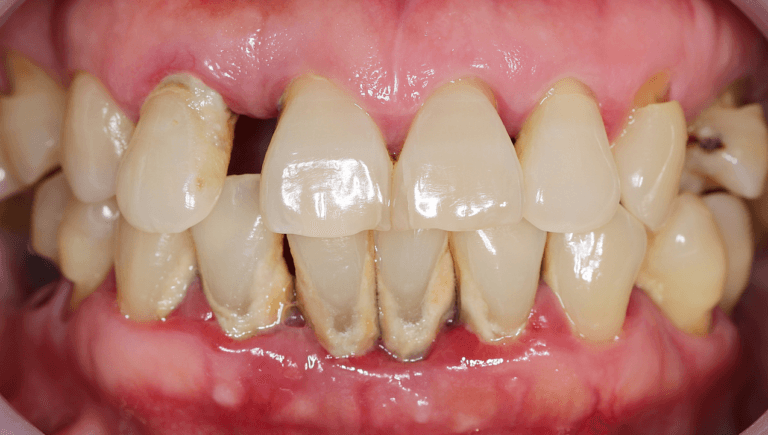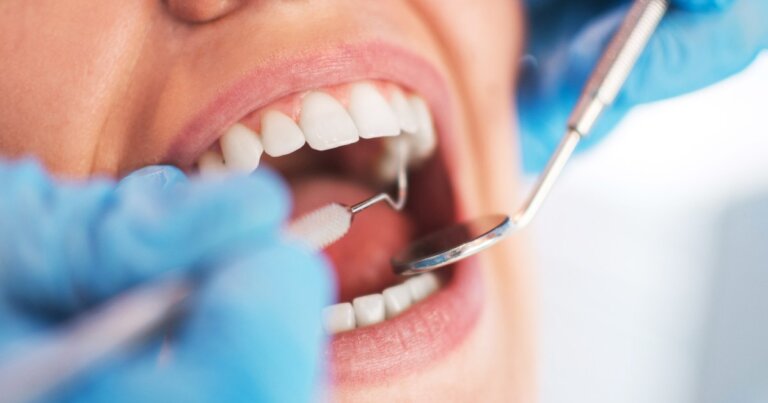Dental Calculus

What Is Dental Calculus?
Dental calculus, also known as tartar, is a hard, yellowish or brownish mineral buildup that forms on teeth and gumline. It is caused by the accumulation of dental plaque, a sticky film of bacteria that forms on the teeth, which hardens over time and becomes difficult to remove. Dental calculus can lead to a variety of dental problems, including bad breath, gum disease, and tooth decay.
If left untreated, dental calculus can progress to more severe stages of gingivitis and gum disease. This can cause significant damage to your oral health. By taking proper care of your teeth and visiting your dentist regularly, you can prevent the buildup of dental calculus and maintain good oral hygiene. Before you contact a Toronto dentist to examine a Dental Calculus issue, there are some things you should know as a patient:
- Why Do I Have Dental Calculus?
- Signs And Symptoms Of Dental Calculus
- Treatment Options For Dental Calculus
- How To Prevent Dental Calculus
- Managing Dental Calculus Until You Can See The Dentist
If you have questions about Dental Calculus or other dental problems, please contact us for more information.
Why Do I Have Dental Calculus?
The human mouth is home to a large and diverse community of bacteria, with an estimated total number of bacteria in the mouth ranging from 100 million to 1 billion. However, it’s important to note that not all bacteria in the mouth are harmful, and some can even be beneficial to our oral health. Everyone will develop dental plaque in their mouth can harden and become tartar. Dental calculus can form on anyone’s teeth, but some people are more prone to developing it than others. Here are some of the reasons why you might have dental calculus:
- Poor oral hygiene: When you don’t brush and floss regularly, dental plaque can accumulate on your teeth and harden into calculus. The longer you go without cleaning your teeth, the more calculus can build up.
- Diet: Consuming a lot of sugary and starchy foods can increase your risk of developing dental calculus. These foods can provide the bacteria in your mouth with the nutrients they need to grow and produce more plaque and calculus.
- Dry mouth: If you have a condition that causes dry mouth, such as Sjögren’s syndrome or taking certain medications, you may have a higher risk of developing dental calculus. Saliva helps wash away food particles and bacteria, so a lack of saliva can contribute to plaque buildup.
- Genetics: Some people may have a genetic predisposition to developing dental calculus and associated diseases like periodontitis. If your parents or siblings have had issues with dental calculus, you may be more likely to as well.
- Smoking tobacco: Smoking can increase your risk of developing dental calculus by causing dry mouth, reducing blood flow to the gums, and increasing the production of plaque.
- Age: As you age, your risk of developing dental calculus increases. This is because the mineral content in your saliva changes, making it easier for calculus to form.
By understanding the causes of dental calculus, you can take steps to prevent it from forming. Maintaining good oral hygiene, eating a healthy diet, and quitting smoking are some of the things you can do to reduce your risk. If you have further questions about Dental Calculus, please contact us.
Signs And Symptoms Of Dental Calculus
Dental calculus can cause a variety of signs and symptoms, including:
- Visible tartar deposits on teeth: One of the most common signs of dental calculus is the presence of visible yellow or brown deposits on the teeth, especially near the gumline.
- Bad breath: Dental calculus can cause persistent bad breath, also known as halitosis. This is because the bacteria that produce calculus also release odorous gases.
- Swollen and bleeding gums: As dental calculus irritates the gums, they may become swollen, red, and tender. This can cause bleeding when brushing or flossing.
- Tooth sensitivity: When dental calculus builds up near the tooth roots, it can cause sensitivity to hot or cold temperatures and sweet or sour foods.
- Receding gums: Dental calculus can cause the gums to pull away from the teeth, exposing more of the tooth roots. This can lead to tooth sensitivity and an increased risk of tooth decay.
- Tooth mobility: In advanced cases of dental calculus build up, it can cause gum disease which will make the teeth loose and shift out of position. This can cause difficulty chewing and speaking, and may require extensive dental treatment.
If you experience any of these signs and symptoms, it’s important to consult with a dental professional as soon as possible. Dental calculus can lead to more severe oral health problems if left untreated, so early detection and treatment are crucial. If you have further questions about the signs and symptoms of Dental Calculus, please contact us.
Treatment Options For Dental Calculus
If you have dental calculus, there are several treatment options available to help remove it and prevent further buildup, including:
- Dental cleaning: The most common treatment for dental calculus is a professional dental cleaning, also known as a scaling and root planing. During this procedure, a dental professional uses specialized tools to remove the calculus from the teeth and gums.
- Periodontal surgery: In advanced cases of dental calculus build up causing gum disease, gum surgery may be necessary to remove the deep subgingival calculus and restore gum and bone tissue. This may involve procedures such as gum grafting or bone regeneration.
- Antibiotics: In some cases, a dental professional may prescribe antibiotics to help treat an infection caused by dental calculus.
By working with a dental professional and taking steps to prevent dental calculus, you can maintain good oral health and prevent more severe dental problems down the line. If you have further questions about treatment options for Dental Calculus, please contact us.

How To Prevent Dental Calculus
Preventing dental calculus is essential for maintaining good oral health. Here are some tips to help prevent calculus buildup:
- Brush your teeth twice a day: Brush your teeth for two minutes, twice a day using a fluoride toothpaste. This helps remove plaque and prevent calculus buildup. We recommend a soft bristle brush like the Curaprox CS5460 Ultra Soft Swiss Toothbrush or an electric toothbrush like the Philips Sonicare Protectiveclean 6100.
- Floss daily: Flossing helps remove plaque and food particles from between the teeth and along the gumline, where calculus tends to form. Take a look at our dental floss oral hygiene guide for tips and tricks.
- Use a tartar-control toothpaste: Using a toothpaste with tartar control properties can help prevent further buildup of dental calculus. We highly recommend Crest Pro Health Gum Detoxify Deep Clean Toothpaste which has a unique formula that penetrates deep into the gums, providing a deep clean that helps to neutralize harmful bacteria and promote gum health.
- Use an antiseptic mouthwash: Using an antiseptic mouthwash can help kill bacteria that cause calculus. We highly recommend a gum care mouth rinse like Crest Gum Care Mouthwash Oral Rinse.
- Use a water flosser: A water flosser is an effective tool for cleaning between teeth and along the gumline. The Waterpik Aquarius Water Flosser is the best all-around water flosser for improving your oral health.
- Quit smoking: Smoking can increase your risk of dental calculus, as well as other oral health problems. Quitting smoking can improve your oral health and overall health.
- Limit sugary and starchy foods: Eating a diet high in sugar and starch can increase your risk of dental problems, including calculus. Try to limit your intake of these foods and opt for healthier options such as fruits, vegetables, and whole grains.
- Drink plenty of water: Drinking water can help wash away food particles and bacteria that contribute to calculus buildup.
- Visit your dentist regularly: Regular dental check-ups and teeth cleanings can help detect and treat dental calculus before it becomes a more significant problem.
By following these tips, you can help prevent dental calculus and maintain good oral health. If you have further questions about how to prevent Dental Calculus buildup, please contact us.
Managing Dental Calculus Until You Can See The Dentist
If you are experiencing problems associated with dental calculus and cannot see a dental professional immediately for a teeth cleaning, there are some steps you can take to manage the symptoms and prevent further buildup:
- Follow our oral hygiene recommendations on how to prevent further build up of calculus. This includes brushing your teeth twice a day, flossing daily, using a tartar-control toothpaste, using an antiseptic mouthwash, and using a water flosser daily.
- Quit smoking: Smoking can increase your risk of dental calculus, as well as other oral health problems. Quitting smoking can improve your oral health and overall health.
- Dietary changes: Eating a diet high in sugar and starch can increase your risk of dental problems, including calculus. Try to limit your intake of these foods and opt for healthier options such as fruits, vegetables, and whole grains. Additionally, drink plenty of water. Drinking water can help wash away food particles and bacteria that contribute to calculus buildup.
- Rinse with warm salt water: Rinsing your mouth with warm salt water can help soothe swollen or bleeding gums caused by dental calculus.
- Apply a cold compress: If you experience swelling or discomfort, applying a cold compress to the affected area can help reduce inflammation.
- Avoid hard and sticky foods: Hard and sticky foods can aggravate dental calculus and cause further discomfort. Avoid these foods until you can see a dental professional.
- Use Over-the-Counter Pain Medication: Over-the-counter pain medication can help relieve dental calculus-associated gum pain. You are also welcome to use over the counter pain relievers such as ibuprofen (Advil) or acetaminophen (Tylenol). Ask your dentist what dosage is right for you, but if you do not have a pre-existing medical condition of allergies, 1000mg acetaminophen (Tylenol) with 600mg ibuprofen (Advil) every 4-6 hours or as needed is a very powerful combination.
It’s important to note that these tips are only temporary measures and that professional treatment is necessary to fully remove dental calculus. If you are experiencing symptoms of dental calculus, be sure to schedule an appointment with a dental professional as soon as possible. For more information about how to manage Dental Calculus buildup, please contact us.

